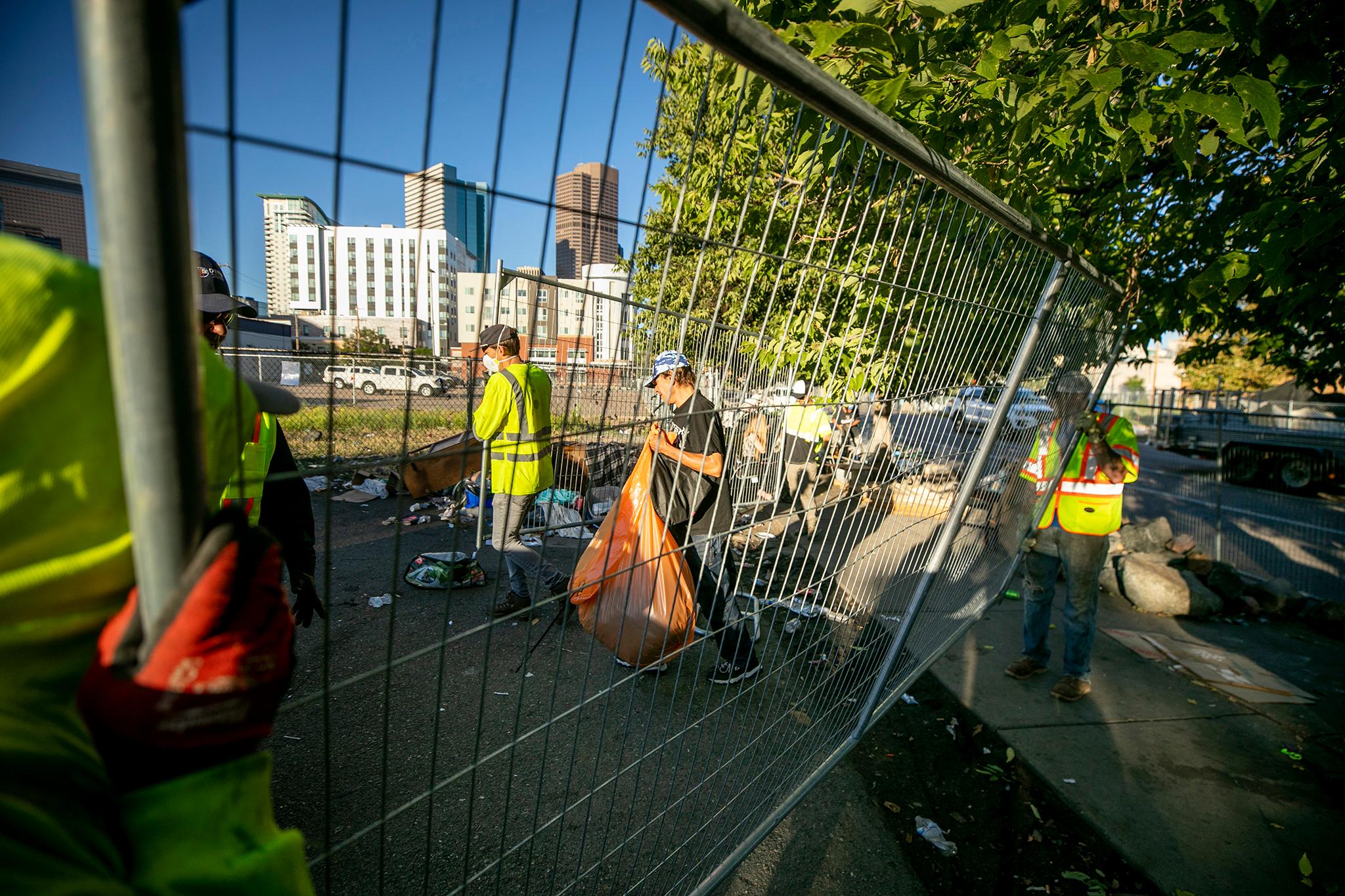It's 7 a.m. Friday morning in Five Points. Orange-vested city workers lug fencing to block off a stretch of tents lining Stout Street between 22nd Street and Park Avenue.
What takes place over the next hours isn't debate or rhetoric or policy. It's literally moving an entire block of people and all their belongings from where they are to anywhere else.
Sgt. James Lucero, who has overseen forced encampment cleanups for nearly two years, tells reporters waiting to witness Mike Johnston's first homeless sweep to move down the block. The reporters comply.
City workers begin to encircle unhoused people with fencing. Many, trying to follow orders and remove their belongings, are confused about how to get out.
A woman wrapped in a blanket sleeps in a lawn chair. Another applies makeup, looking into a handheld mirror. A man pulls a cart filled with all his belongings, struggling to lift it over cracks in the sidewalk.
Volunteers from Mutual Aid Monday pour people coffee, ready to help people pack up and move from this block to the next.
Terri Washington, a formerly homeless advocate with the Housekeys Action Network Denver (HAND), has been to many sweeps in the past year. She looks around at the reporters and the activists who showed up.
"Everybody's out here today because it was announced by the mayor that this is what was going to happen," she says. At past cleanups, the city has been more aggressive. Things are calmer this time, in part, because journalists, representatives from the mayor's office and activists are witnessing what's happening. "They're not usually out here at all."

Cole Chandler, the mayor's senior advisor on homelessness, is watching the sweep.
He and the mayor, who declared a state of emergency over homelessness, believe the sweeps are bad policy and hurt people's chances of finding long-term housing. But a rat infestation has triggered this forced cleanup by the Denver Department of Public Health and Environment.
"The mayor's senior staff is just here to bear witness to what's taking place," he says. "We want to live in a world where these kinds of events aren't required."
Johnston has pledged to get 1,000 people housed by the end of the year. But at this sweep, housing is not one of the services the city can offer.

"We know that these folks are just going to wind up in another camp on another block," Chandler says. "And that is not an effective solution."
Homelessness, as he sees it, is a housing issue. In cities where rent is expensive and vacancy rates are low, regional homelessness rises.
"We've been seeing that in Denver over the last 10-plus years," he says. "More and more people have become unsheltered each and every year. And so that's what we've got to work to resolve."
Ana Gloom, an advocate with HAND, rushes toward Chandler.
"Yo, Cole, this is your city," Gloom says. "They can't get their s*** out if they're locked in."
"I understand," Chandler replies. "That's something we're checking out for sure. We've talked about that, Ana."
"Right now, what are they supposed to do?" Gloom asks.
"I understand," Chandler responds. "That's something that we're definitely going to be looking at."
"Can you not push them to open it?" Gloom asks, pointing toward the fence.
Chandler leaves to address the issue.
"This is just the same-old same-old," Gloom says. "Hopefully this time the employees will not be so rude to the people themselves, but we'll see."
She, too, walks away trying to find somebody from the city to open the fence to help a man obey the city's orders to leave.
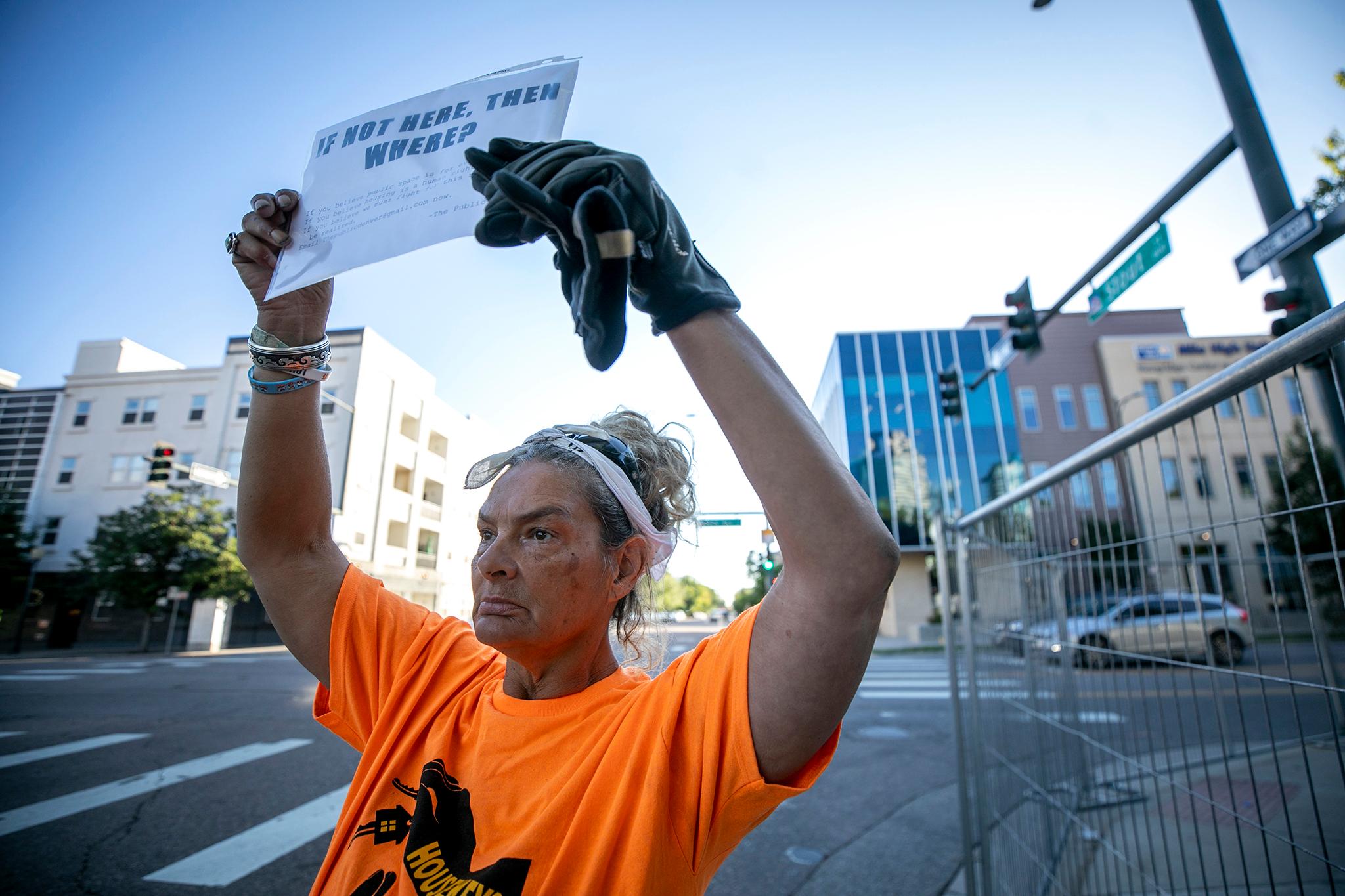
"They're asking us to move so they can clean up what they believe is a rat infestation," says David Sjolberg, as he takes apart his tent.
Sjolberg used to work security for the Broncos and the Nuggets. He's wearing a Colorado Rockies shirt a friend gave him.
He normally stays with his wife on the outskirts of town, off the grid. She was assaulted two weeks ago and had been missing. Sjolberg moved to the Stout Street encampment, hoping to reconnect.
"I just found her," he says. "We have been getting an apartment set up." But his phone was stolen, and it's been hard to figure out the details of the move. "I'm not even sure if I still have our housing. It's just been really, really tough."

Sjolberg has not considered using the shelter system, because he would have to leave his wife. Staying together keeps them safer than trying to survive apart.
This is the first time he's lived in a public encampment. People have stolen his things, and he's never sure who he can trust.
Private property owners put rocks here to make it tough to camp. People moved their tents in anyway. And then rats moved into the spaces between the rocks.
"I've never had them bite me or come at me," Sjolberg says, but a rat did bite his wife's foot.
Keeping up with appointments while living on the street has been difficult. He recently missed a treatment for his Crohn's disease.
"I'm very sick," he says. "And who knows when I'll be able to get back to the doctor again."
His arm is covered in open wounds he knows he needs to clean but can't until his tent is packed up. He doesn't want to lose everything he owns.
"We have to take it one step at a time to be able to make it," he says.
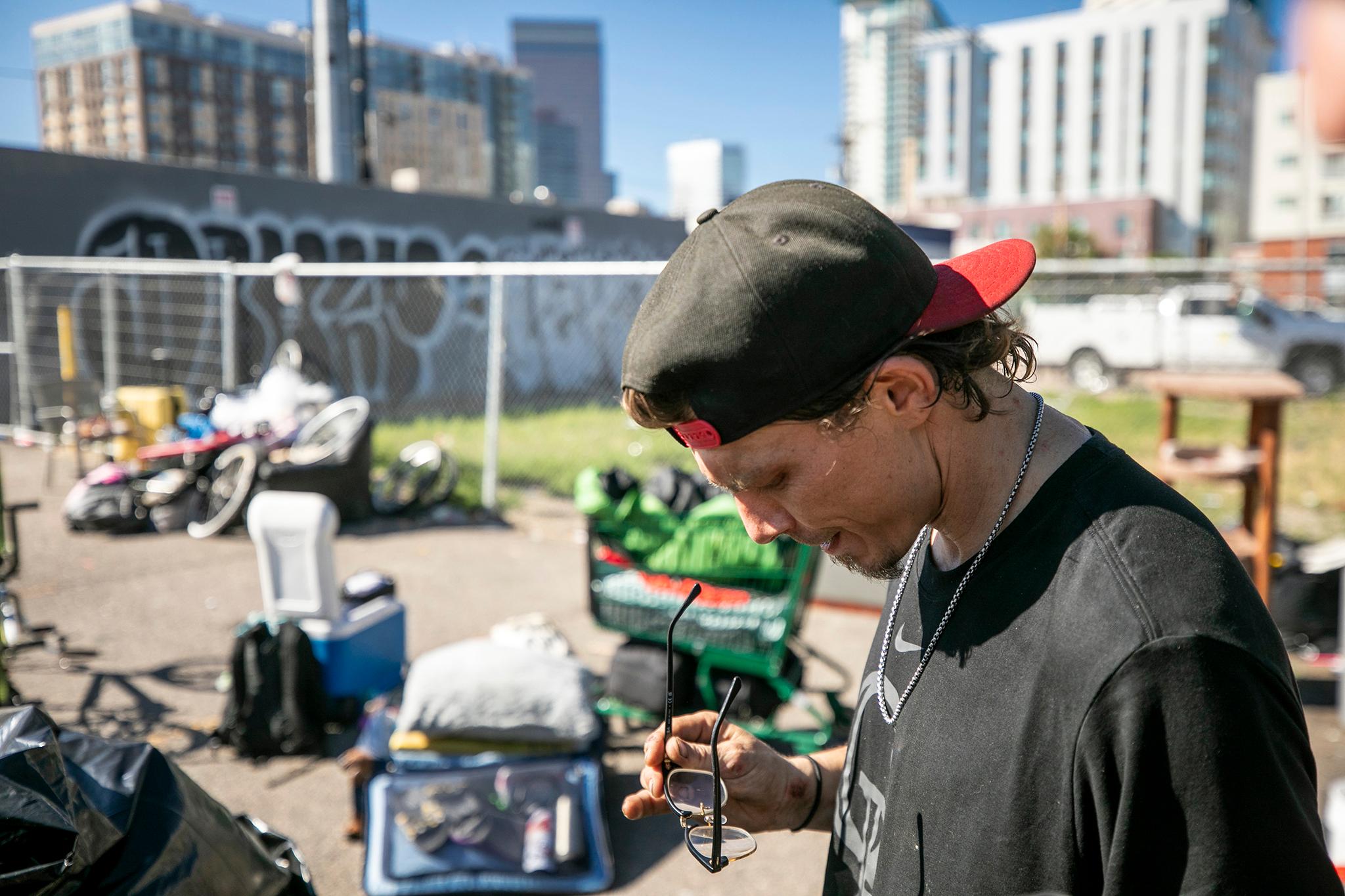
Jerry Burton, a formerly homeless veteran and advocate with HAND, looks up and down the block where he used to sleep in a tent.
"I lived here for about a year and a half," he says. "And we had no rat problem. The rat problem did not come until they started putting down the rocks."
As he watches the sweep, he says the only thing that's different is the timing. The city scheduled the cleanup at 7 a.m. instead of 5 a.m.
He wishes Denver workers wouldn't take people's belongings.
"A tent is still a house," he says. "These are people's houses. They don't do it to me. They don't do it to you. Why are we doing this to our unhoused neighbors? If we're going to close down the street, close it down by putting them in housing...
"That way a person knows where they're going to be every night, which creates stability within your mind, the body starts to heal, and they can become a productive member of society again," he adds.
Burton has been in conversations with Johnston over the past few weeks. He's glad the mayor wants to give people homes, but so far, he's not seeing it happen.
"You talk about housing 1,000 people," Burton says. "But I don't see his plan. You know? I need to see a plan."

Fenced in, newly elected At-Large City Councilmember Sarah Parady walks through the encampment.
This is not the first sweep she's witnessed, but it's the first one to happen after she took office. Compared to previous forced cleanups, "I feel like the temperature's a little lower," she says.
The unhoused people she speaks with are showing grace to the new mayoral administration and are optimistic that Johnston's promises of housing will pan out.
"I really hope that we live up to that grace that I'm seeing them extending today," she says.
Parady has concerns about how the city is balancing public health and safety.
She wonders which is deadlier: rats or encampment sweeps - which have been shown to decrease life expectancy by a study published by the Journal of the American Medical Association.
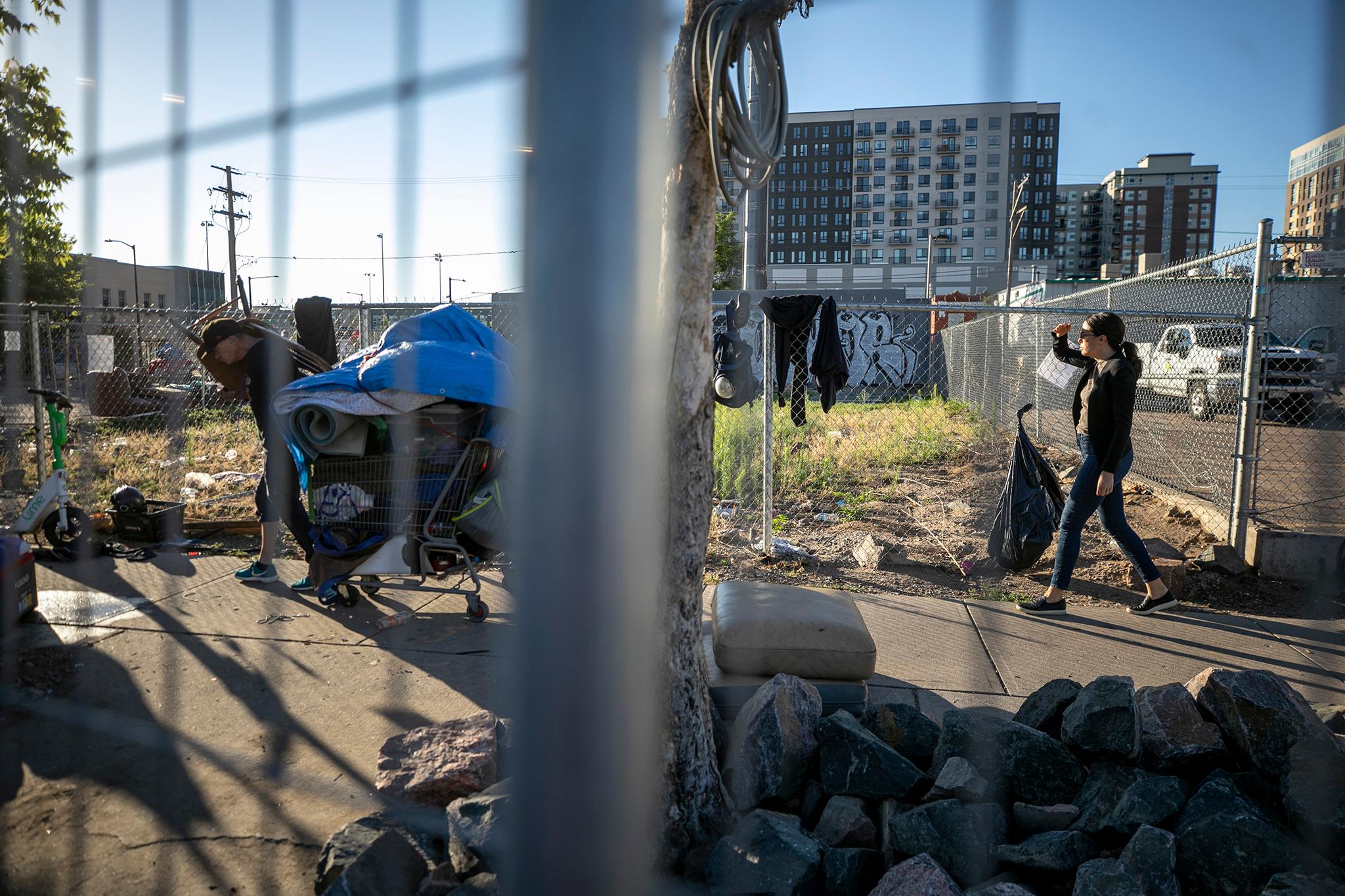
Nic Lovett stays nearby in a shelter. He's too paranoid to sleep on the streets and has never gone through a sweep. But the shelter isn't a great option, either.
"There's a lot of disrespectful people there," he says. "And you know how it is. Everyone don't want to go to sleep at the same time. Everyone don't want to keep the music down. So even in the shelter, it's a coping thing."
Lovett, who is Black, has been watching the Stout Street encampment for weeks but has largely steered clear because of racial tensions.
"We're homeless," he says. "But we are still sectioned off."
Lovett moved to Denver in 2012. He spent five years in prison. When he got out, he didn't have a place to stay, so he moved to the streets.
He's looked for work, but his efforts have proven futile.
"That nine to five -- people ain't trying to hire you when you need it," he says. "You want to give up. I'm getting tired of looking if ain't no one trying to help, you know?"
He sees his friend and waves.
"Julio!"
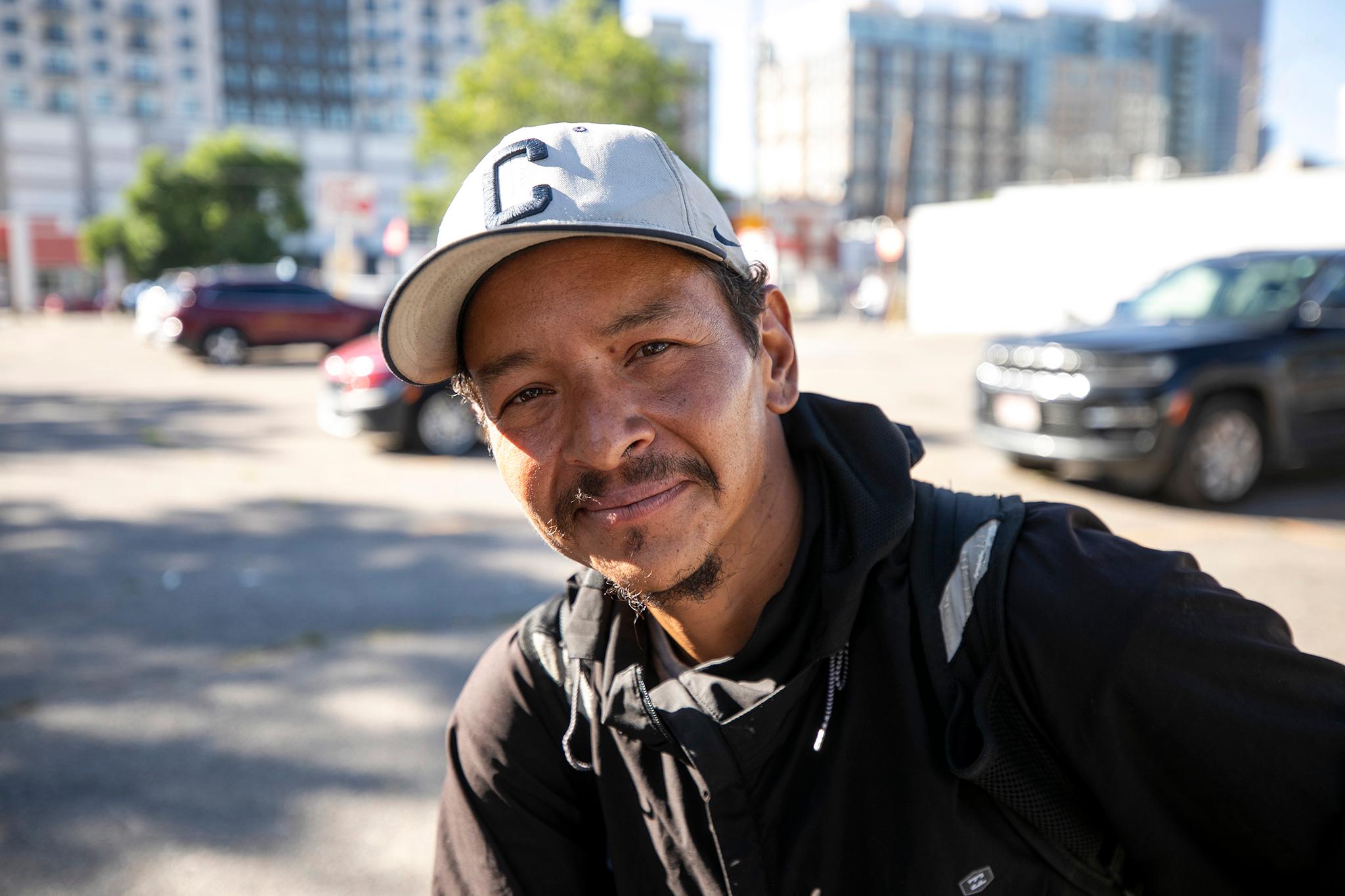
Julio Bonilla Sibrian rolls up on a bike after he's moved his belongings from the encampment.
Bonilla Sibrian served in the army in El Salvador. But when political tensions escalated, he moved to Houston in 2004, lived in New York for a stint, working in restaurants, and then returned to Houston to take a job as a home painter.
One day, while he was working, a group of men approached him and shot him from behind 14 times with a .45. He fell to the ground and damaged a nerve, making it temporarily impossible to talk.
After the shooting, Bonilla Sibrian no longer felt safe in Houston. So he moved to Granby to work on a construction project. When that job finished, he moved to Denver.
"That was the biggest mistake of my life," he says.
He acknowledges Denver has some strong services for unhoused people, but they're mostly not what he's looking for.
"I'm thinking I can make it happen with God," he says. "And maybe this new mayor."
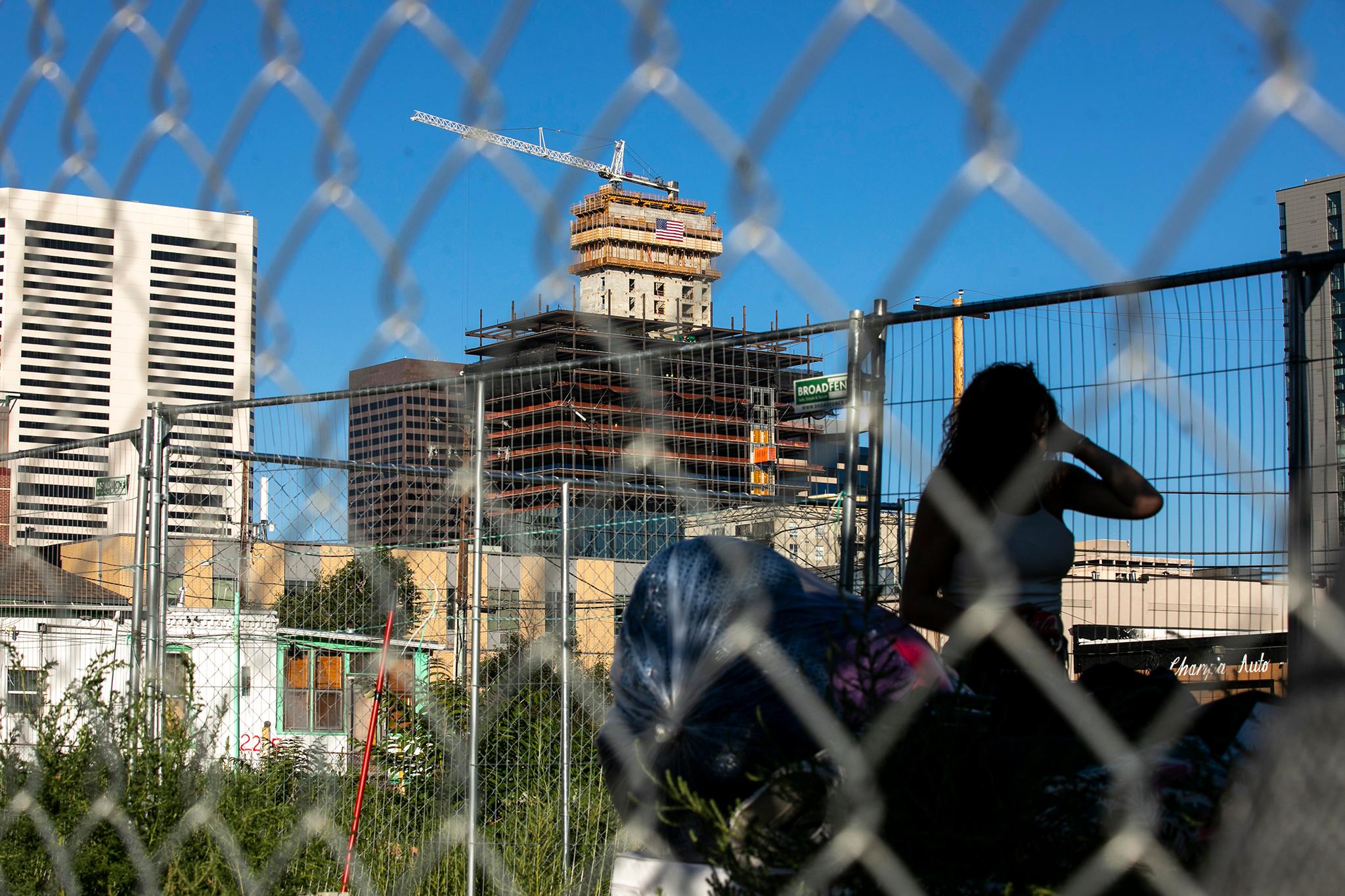
Bonilla Sibrian rolls up his sleeve and pulls up his shirt to show the scars from the bullet holes.
He pulls back his lip to show the part of his mouth that was paralyzed.
These days he can walk and talk again, but his recovery took over two years and cost more than $1 million. When it's cold at night, his leg aches. He works construction jobs when he can, but lifting more than 40 pounds is tough.
He's been frustrated in recent months as he's watched Venezuelan migrants arrive in Denver. They have received services and support other immigrants, like him, never had.
"They came zero to 100 with everything," he says. " Documentation. Jobs. Government help. Federal money. Federal housing. That's a big f****** insult to all the immigrants who were here before. We have been paying taxes for 20 years."

Bonilla Sibrian had been staying at a nearby shelter. One night, while he was sleeping, a man tried to grab his backpack.
"I ended up beating him really bad with this rock," Bonilla Sibrian says. He points to the sidewalk still stained with what he says is the man's blood.
Bonilla Sibrian called the police and reported the man's crime. But he no longer felt safe at the shelter, so he moved in with four guys at the Stout Street encampment.
"They gave me a big tent for myself," he says. "I guess they liked my fight."
He enjoyed living there while it lasted.
"Now we gotta be in the streets again," he says. "We don't have a place to move."
Partly, he hopes for a bus ticket to move away from Denver.
"But actually, I just want to wait for this mayor," Bonilla Sibrian says. "We'll see what he can do."

At 9 a.m., Sgt. Lucero announces people have an hour left to finish their move.
Lucero has served in District 6 going on nine years. He's been supervising the police department's homeless outreach for nearly two years.
He says officers are feeling optimistic about Johnston's homelessness plans -- particularly the possibility of offering people actual homes after cleanups.
"It feels like city workers are more engaged," he says. "It was getting so stale with us before. We were becoming really robotic, uncaring. That's never healthy for anybody."
He's happy to see homeless activists helping the people in the encampment move. That was a practice that died off in recent years, and he's glad it's back. Even more, he's looking forward to offering homes to people living on the streets.
"In order for people to be stable in their jobs and in their lives, we need housing," he says. "Even if it's just temporary housing, like an SOS camp or a small tiny home. That's stability. It's more stable than this. This is not stable at all. It's just dangerous. People don't feel safe. It's unhealthy for community. So if we can just make that little leap, we'll be doing a lot better."

Scott Gilmore, the deputy executive director of Denver Parks and Recreation, is wearing a bright neon vest and palling around with Matt Wilmes, who is finishing his last week as the head of the encampment program to return to the health department.
Gilmore is plotting to bring public restrooms to various sites across the city to help ensure people have a sanitary spot to relieve themselves. That's a departure from Mayor Michael Hancock's administration which rejected unhoused residents' requests for publicly available restrooms near encampments.
"It's a dignity issue," Gilmore says.
The restrooms will include heavy-duty sharps containers for used syringes, and he's going to try to include hand washing stations.
The city has set up three new restrooms in the city center at Sonny Lawson Park, the McNichols Building and Skyline Park. Gilmore says the city has hired people -- some experiencing homelessness -- to work at the restrooms and monitor them. He's hoping to expand that program citywide.
But a recent TikTok craze has inspired some people to create bombs and blow up toilets, making his efforts messy.
"The restroom I have the most problems with keeping open is Wash Park," Gilmore says. "They've blown up the toilet four times in the last 16 months. Two weeks ago they ripped all the sinks off."
Wilmes is eager to leave his role so that the city's homelessness resolution efforts can have fresh energy.
"I'm an old hat, and they need a new hat," he says.
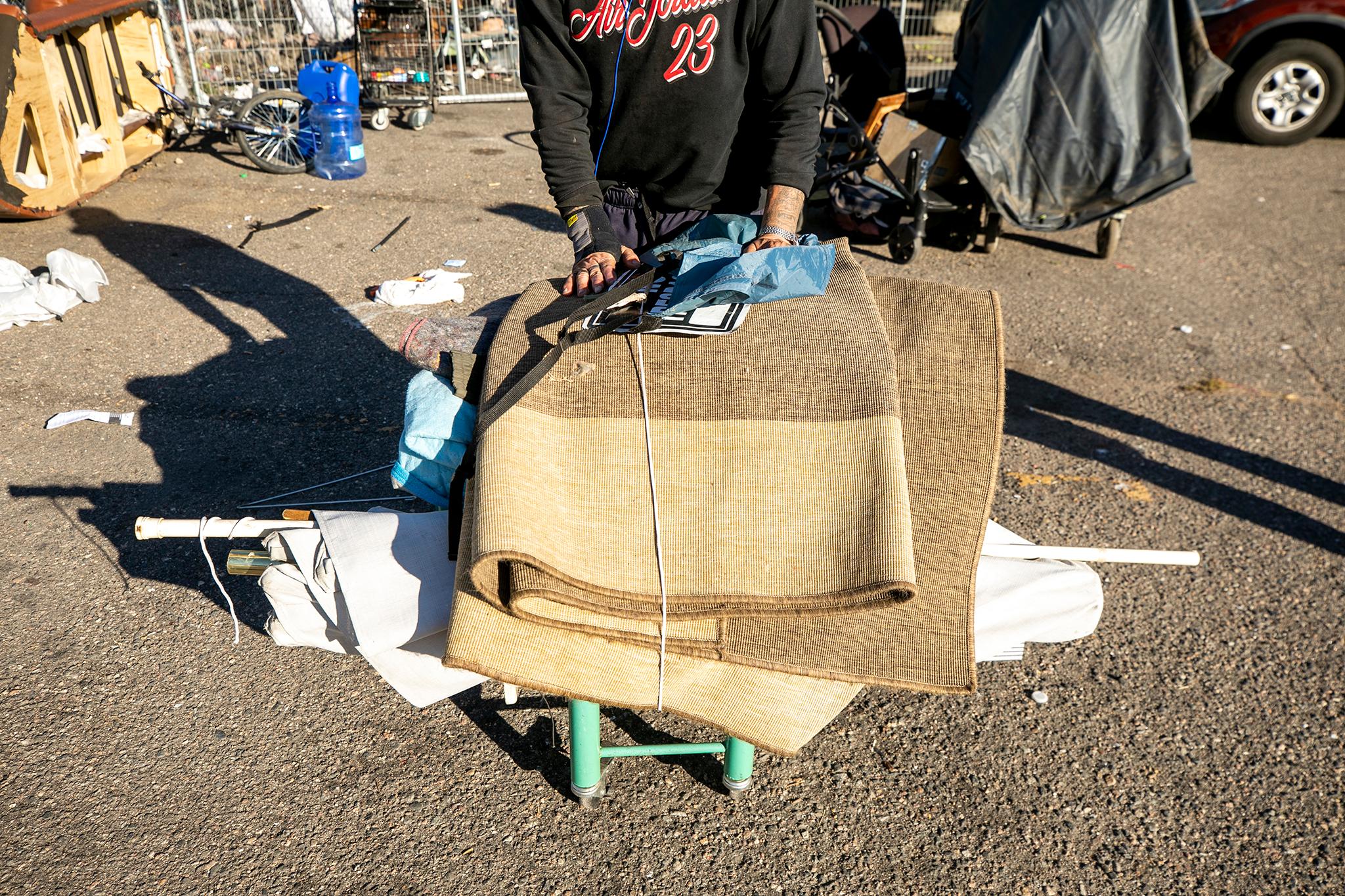
But he's happy to see the administration bringing sanitation services to people experiencing homelessness.
"We're just trying to put all that together to keep these camps safer until [people] find housing," he says.
Wilmes says it's been "all hands on deck" at Johnston's Emergency Operations Center. "It's crazy to see how quickly that ship can go when you're down in the EOC telling people, 'Alright, we got to do this... We got a deadline, man."
Activists finish helping Sjolberg pack his belongings.
He's moved a few yards from the encampment into a parking lot by 9 a.m. He's waiting for his friends to come and help him move to the next block where they are setting up another encampment.
He looks at his bloodied arms.
"My hands are really bad," he says. "I need to clean myself up."
Sjolberg sets up medical equipment. Now that he's moved outside the fencing, he can finally disinfect his wounds.
"I've been taking antiseptic out of the trash so I can do it myself."

Correction: An earlier version of this story stated that Matt Wilmes works for the Department of Housing Stability. He works for the mayor's office.

